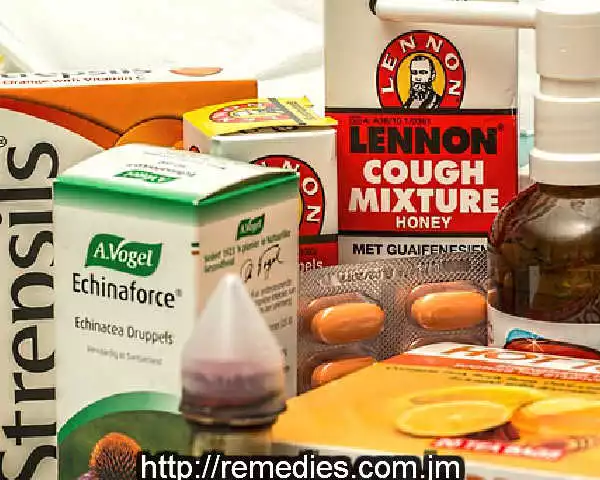Home Remedies for Cough
Every cough has a story, a mystery of the body calling for attention.
Whether it’s the aftermath of a stubborn cold or a response to an invisible speck of dust, knowing the summoning cause could be the key to quieting the relentless tickle.
Coughing, a frequent yet often misunderstood reflex, straddles the line between nuisance and symptom, revealing a tale woven within the respiratory tract.
Understanding the enigmatic soundtrack of coughs – from the dry, scratchy arias to the wet, mucus-laden sonatas – is essential for choosing the right natural remedy.
With a spectrum ranging from throat irritation to the body’s effort to clear excess mucus, each cough has its own identity and, hence, its own solution.
The quest for relief is not just about silence but about healing and harmony within.
As the curtain rises on this compendium of cough quelling, we visit the humble abodes of warm saltwater gargles and steam sessions, explore the restorative powers of honey, and dabble in herbal brews designed to soothe.
Join us on a journey of organic alchemy where lifestyle changes harmonize with rejuvenating concoctions, offering more than mere palliatives but a potential symphony of respiratory relief.
Table of Contents Home Remedies for Cough
Causes of Coughing
Coughing is a natural reflex designed to keep the throat and airways clear, yet various factors can trigger it ranging from environmental irritants to underlying medical conditions.
Allergens such as pollen, dust, animal dander, and mold can prompt allergic reactions leading to cough.
In similar fashion, irritants like cigarette smoke, air pollution, and chemical fumes can exacerbate a cough, especially a dry and persistent one.
Medical conditions are also a prime cause of coughing.
The common cold and influenza viruses often bring with them bouts of coughing.
Asthma, bronchitis, and pneumonia are respiratory conditions that commonly present with this symptom.
In addition, some non-respiratory ailments, like gastroesophageal reflux disease (GERD), can give rise to a chronic dry cough due to irritation from stomach acids flowing back into the esophagus.
Certain medications, such as ACE inhibitors used for high blood pressure, can induce coughing as a side effect.
Meanwhile, serious conditions including COPD, lung cancer, and heart failure may manifest a cough as a symptom, warranting immediate medical attention.
Regardless of the cause, it’s important to pay attention to the type and persistence of a cough, as it can be an indicator of various health issues.
Understanding the Underlying Respiratory Tract
The respiratory tract is a complex system comprising structures like the sinuses, nasal passages, pharynx (throat), and larynx (voice box).
Infections can assail these areas leading to symptoms such as sneezing, coughing, sore throat, fever, and nasal congestion.
The most common culprits of such upper respiratory tract infections are viruses like the rhinovirus, which causes the common cold, and the influenza virus.
However, bacteria like streptococci can also spur infections in the upper respiratory tract, albeit less commonly than viruses.
Viral infections are typically self-limiting and often managed with over-the-counter medications, plenty of fluids, and home remedies, while bacterial infections may require antibiotic treatment.
To prevent and manage these infections, maintaining good hydration, consuming a diet rich in fruits, and avoiding triggers of acid reflux can all be beneficial for reducing excess mucus, thereby maintaining a clear airway.
Common Cold and Respiratory Trac Infections
In combating respiratory tract infections, several home remedies have stood the test of time and scientific scrutiny.
Honey, for instance, not only soothes sore throats but also can reduce nighttime coughing, enhancing sleep quality, particularly in children with respiratory infections.
Turmeric, with its active ingredient curcumin, can alleviate inflammation associated with dry coughs and has long been used in traditional medicine for respiratory issues.
Ginger is another superhero in the home remedy toolkit thanks to its antibacterial and anti-inflammatory properties, which can support the immune system and ease discomfort associated with respiratory infections.
It’s important to identify the cause of a cough as different factors such as allergies, changes in seasons, runny noses, or heartburn can be involved.
Home remedies tailored to these causes, encompassing ginger, honey, turmeric milk, and various herbs, can offer respite from a range of cough-related symptoms, from the persistent to the occasional.
Postnasal Drip and Mucus Production
Postnasal drip represents a situation where excess mucus trickling down from the nasal passages into the throat causes irritation and cough.
Seasonal allergies, environmental dryness, and infections can all induce this condition.
A healthy production of mucus is crucial for trapping and expelling foreign particles and pathogens; however, too much mucus, particularly if discolored, can be problematic.
To manage excessive mucus, antihistamines and decongestants can be helpful, especially when postnasal drip is allergy-induced.
For clearing congested nasal passages and reducing mucus buildup, saline solutions or neti pots can be employed effectively.
It’s crucial to note any significant changes in mucus, as yellow, green, brown, or bloody discharge may signify a more serious underlying condition and should be evaluated by a healthcare professional.
Different Types of Coughs
Coughing serves as a mechanism for clearing the respiratory tract of irritants, allergens, or pathogens.
There are different types of coughs, each with distinct characteristics and implying different underlying causes.
A dry cough, which does not produce mucus, can be particularly nagging and often accompanies viral infections or is triggered by environmental irritants such as dust or smoke.
In contrast, wet coughs are characterized by the presence of mucus, signalling that the body is attempting to clear out the congestion from the lower respiratory tract.
This type of cough can be associated with a common cold, flu, or pneumonia.
It is crucial to recognize the type of cough, as this knowledge can guide the appropriate treatment—whether it be remedies that soothe the throat or those that aid in the expulsion of mucus.
Dry Coughs and Throat Irritation
For those suffering from dry coughs and accompanying throat irritation, various home remedies can offer comfort and relief.
Warm beverages, such as hot tea, lemon water, or clear broths, can provide soothing relief and reduce the chill that sometimes accompanies illness.
Gargling with salt water—a mixture of half a teaspoon of salt in a cup of warm water—can effectively reduce throat swelling and calm the cough reflex.
Natural remedies are widely heralded for their soothing effects on dry coughs.
Ingredients like ginger, with its antibacterial and anti-inflammatory properties, not only strengthen the immune system but also ease pain and discomfort.
Additionally, herbs such as thyme, peppermint, licorice root, and marshmallow root contain antioxidants and anti-inflammatory agents that can help alleviate throat swelling.
Many of these herbs are found in cough syrup and lozenges specifically tailored to soothe the throat and reduce the irritation causing a dry cough.
Wet Coughs and Excess Mucus
When it comes to wet coughs accompanied by excess mucus, the goal is to thin the mucus for easier expulsion.
Over-the-counter remedies such as antihistamines and cold medications can be helpful, as can nasal irrigation methods enhanced by saline solutions or neti pots for alleviating nasal congestion.
Age-appropriate chest rubs containing eucalyptus can serve as natural expectorants, easing the elimination of phlegm.
Meanwhile, honey has long been revered for its role in home remedies, and when added to herbal teas like peppermint or ginger, it can further assist in thinning mucus and soothing coughs.
Lastly, maintaining moist air in the sleeping environment is beneficial for individuals with wet coughs.
A cool-mist humidifier can add much-needed humidity to the room, helping to keep nasal passages clear and preventing nighttime sore throat, ultimately leading to more restful sleep and faster recovery.
It is vital, however to monitor the color and consistency of mucus, as discolored or blood-stained mucus may indicate a more serious condition and warrant professional medical advice.
Home Remedies for Coughing
One of the simplest and quickest ways to relieve a cough and soothe a sore throat is gargling with warm salt water.
This time-honored remedy works by reducing inflammation and helping to clear away excess mucus.
To prepare the solution, dissolve half a teaspoon of salt in an 8-ounce glass of warm water.
Gargle gently for about 30 seconds and spit the solution out.
Repeating this process up to three times daily can shorten the duration of a cough and alleviate the discomfort associated with it.
Steam Inhalation for Nasal Congestion
Steam inhalation is an effective method for easing nasal congestion and throat irritation resulting from coughs.
Breathing in the warm, moist air from hot water vapor for 2 to 3 minutes can help thin the mucus in the respiratory tract, providing immediate relief and improving breathing.
This natural remedy also moisturizes the irritated tissues of the nasal passages and can be done several times a day to keep airways clear.
Honey and Warm Water Mixture
A mixture of honey and warm water serves as a gentle and natural cough suppressant.
Scientific studies have suggested that honey is comparable to dextromethorphan, a common ingredient in over-the-counter cough medicines, in its ability to ease cough symptoms and improve sleep.
Simply mix 2 teaspoons of honey into warm water, with a squeeze of lemon for added benefit, and drink the concoction to alleviate dry and irritated throats.
Herbal Teas for Soothing the Throat
Herbal teas, such as thyme, chamomile, and peppermint, offer more than just warmth—they have properties that can relax throat muscles, soothe irritation, and reduce the cough reflex.
Drinking herbal tea stimulates saliva production, which can help to keep the throat moist and reduce discomfort.
Each herb brings its own benefits; for example, chamomile is particularly soothing to the throat, while thyme can ease inflammation associated with respiratory conditions.
Ginger and Lemon Drink for Cough Relief
Ginger has a long-standing reputation for aiding respiratory health, thanks to its anti-inflammatory and antitussive (cough-suppressing) qualities.
A homemade ginger tea, infused with honey and lemon, can help to break down and expel mucus, ease breathing, and ultimately provide relief for coughs.
Adding ginger to your daily diet can suppress the reflex that triggers coughing, and when used in a drink, it can be comforting, particularly during cold periods.
Lifestyle Changes to Alleviate Coughing
Alleviating cough doesn’t always require medical intervention.
Simple lifestyle changes can greatly contribute to easing your cough.
Sticking to a routine of drinking warm fluids can loosen mucus and provide throat relief.
For children, especially, using a cool-mist humidifier in their room can create a more comfortable environment that helps ease nighttime coughing.
A warm bath or shower can mimic the effects of steam inhalation, assisting in clearing nasal passages.
Additionally, you may help prevent the onset of cough-inducing respiratory tract infections by staying well hydrated, avoiding irritants, keeping hand hygiene a priority, and integrating beneficial ingredients like thyme into your dietary habits.
Maintaining Hydration with Warm Fluids
Consuming warm fluids such as herbal teas, broths, or lemon-infused water can be comforting and beneficial for those suffering from a cough.
Such liquids add moisture to the throat, offering immediate relief.
Staying hydrated is particularly important for those with dry coughs, as it maintains necessary moisture in the throat for healing.
Drinking warm water mixed with honey is a known soothing agent for an irritated throat.
However, remember that children under one year should not consume honey due to the risk of infant botulism.
For those dealing with seasonal allergies, hydration can assist in reducing sinus congestion by thinning mucus and promoting drainage.
Using a Cool-Mist Humidifier for Moist Air
Cool-mist humidifiers add moisture to the air, which can alleviate symptoms of coughing and congestion.
Recommended by health authorities such as the Mayo Clinic and CDC, these devices can be particularly useful during the cold season.
Placing a cool-mist humidifier in the bedroom can also promote restful sleep by keeping nasal passages clear and reducing throat soreness.
To prevent the growth of bacteria or mold in the humidifier, it’s important to change the water daily and clean the unit as per the manufacturer’s instructions.
Avoiding Irritants and Allergens
Environmental irritants such as smoke and dust, as well as strong odors, can trigger or worsen coughing.
It’s crucial to maintain a clean living space and steer clear of these irritants.
Allergens like pollen, dust mites, pet dander, and mold can lead to episodes of cough, so minimizing exposure is essential.
Other irritants such as smoke, pollution, and perfumes should also be avoided as they can induce coughing.
Instead, consider investing in air purifiers and using cool-mist humidifiers to reduce allergens in your environment, and eliminate smoking or vaping to improve air quality and alleviate cough symptoms.
Proper Hand Hygiene to Prevent Viral Infections
Proper hand hygiene is an integral part of preventing viral infections, which often present with coughing as a symptom.
Regular and thorough hand washing with soap and water, for at least 20 seconds, can decrease the risk of spreading infectious agents.
Hand washing is a fundamental practice not only to protect yourself but also to minimize the risk of infecting others.
Regular hand cleaning is especially recommended during peak seasons for colds and flu to limit the transmission of viruses and maintain overall health.
Over-the-Counter Remedies for Coughing
When it comes to easing the discomfort of a persistent cough, over-the-counter (OTC) remedies may provide relief.
There are two primary types of OTC cough medicines: cough suppressants, like dextromethorphan, which is found in products such as Triaminic Cold and Cough, Robitussin Cough, Delsym, and Vicks 44 Cough and Cold, and expectorants that aim to thin mucus to make it easier to cough up.
Dextromethorphan serves to quiet the cough reflex and has been shown to be modestly more effective than a placebo in studies.
On the other hand, expectorants like guaifenesin work by thinning the mucus so that it can be expelled more easily when you cough.
Contrarily, avoid decongestants containing pseudoephedrine if you have high blood pressure, as it may raise heart rate and blood pressure even though it can help stop postnasal drip that causes coughing.
Cough Drops and Lozenges for Temporary Relief
Cough drops and lozenges are popular options to temporarily ease a cough and soothe an irritated throat.
These medicated lozenges often contain ingredients such as menthol, which can numb the throat and reduce the cough reflex.
Additionally, some varieties include natural substances like ginger or eucalyptus for an extra soothing effect.
However, caution is advised when it comes to children.
Do not give cough drops to children under 4 years of age because of the choking risk.
Even older children should be supervised closely as they can still present a choking hazard.
While cough drops and lozenges can offer short-term relief, they are not a cure for underlying conditions that cause coughing.
Using Cough Medicines Sparingly and as Directed
When using cough medicines, especially those containing antihistamines or decongestants, it’s important to use them as directed and sparingly.
Medicines with antihistamines can occasionally thicken mucus, potentially exacerbating a cough.
For severe coughs, a doctor might prescribe cough suppressants with codeine or other narcotics which offer more considerable relief.
In cases where the cough is due to bacterial infections like whooping cough or pneumonia, antibiotics such as penicillin, cephalosporins, or azithromycin may be required.
For allergy-related coughs, inhaled nasal steroids can be prescribed.
Lastly, remember that a cough is the body’s way of clearing the respiratory tract; suppressing it excessively is not recommended.
It is always advisable to consult with a healthcare professional for prolonged or severe coughs.
Herbal Products and Supplements for Cough Relief
Herbal products and supplements have been used for centuries to alleviate cough symptoms.
Herbs like marshmallow root, licorice root, and slippery elm are known for their demulcent properties, which provide a soothing film over mucus membranes and help relieve throat irritation.
Marshmallow root is particularly notable for its effectiveness in relieving dry cough.
Its demulcent properties form a gelatinous substance that coats the throat, offering a relief similar to cough suppressants.
A herbal cough syrup containing marshmallow root, thyme, and ivy has been recognized for its effectiveness in a small study, providing relief for coughs associated with common colds and respiratory infections.
Additionally, marshmallow root has antioxidative and anti-inflammatory benefits and may offer relief swiftly, sometimes in about 10 minutes, making it a favorable natural option for cough relief.
As with any substance, consult with a healthcare provider before starting any herbal supplements, especially if you are taking other medications or have underlying health conditions.
When to Seek Medical Attention
A cough, while often a benign symptom associated with common colds or allergies, can sometimes be an indicator of a more serious condition.
It is crucial to monitor the duration and accompanying symptoms of a cough to determine when medical attention is necessary.
If you find your cough persisting for more than 10 days, it is advisable to consult a healthcare professional.
Unpleasant-smelling nasal discharge may suggest an infection, and along with blurred vision and a stuffy nose, it can signal significant issues that require prompt medical evaluation.
Additionally, if you observe yellow or white spots on the back of your throat, this could indicate a strep throat or other infections and should be looked at by a doctor.
For those suffering from severe allergies or sinus infections that don’t improve with home remedies, professional medical attention may be required to manage the symptoms effectively and prevent further complications.
Persistent Coughing that Lasts for Several Weeks
Most people expect a cough to clear up within three weeks; however, persistent coughing that extends beyond this typical timeframe or worsens over time deserves attention.
A dry cough lingering for more than 2 months may point to underlying medical conditions like asthma, GERD, or even chronic bronchitis, which require medical evaluation and treatment.
In the case of GERD, stomach acids refluxing into the esophagus can lead to throat irritation and a cough triggered by eating.
Furthermore, while natural remedies may offer relief, the lack of FDA monitoring for purity and safety of herbs and supplements underscores the need to consult with a healthcare provider before experimenting with such remedies, to avoid potential adverse interactions with other medications or conditions.
Compounds like honey have shown promise in research for easing coughs associated with respiratory infections and can be considered in managing a persistent cough.
Coughing with High Fever and Difficulty Breathing
A dry cough accompanied by a high fever and difficulty breathing is a symptom combination that should never be ignored, as it can be indicative of serious viral infections like COVID-19 and demands immediate medical attention.
In the interim, simple home remedies such as staying well-hydrated, using humidifiers, and avoiding known irritants can help manage a mild dry cough.
While a viral cough can last from one to three weeks, if it shows no signs of improvement after this period, a healthcare professional should be consulted.
For children, in particular, ensuring that the air is not too dry with the use of a cool-mist humidifier can be beneficial, alongside encouraging the intake of fluids and warm beverages to help ease their symptoms.
Coughing Accompanied by Chest Pain or Wheezing
Chest pain and wheezing that occur with coughing are symptoms that should be promptly addressed, as they may signal respiratory conditions such as asthma, pneumonia, or bronchitis.
Persistent dry coughing itself can lead to chest discomfort due to muscular strain, but when combined with wheezing or pain, it may point to narrowed or irritated airways.
Conditions like chronic obstructive pulmonary disease (COPD) could also present with these symptoms.
It is essential to seek medical advice when experiencing a cough accompanied by chest pain or wheezing to accurately diagnose the underlying cause and obtain appropriate treatment to prevent further health complications.







